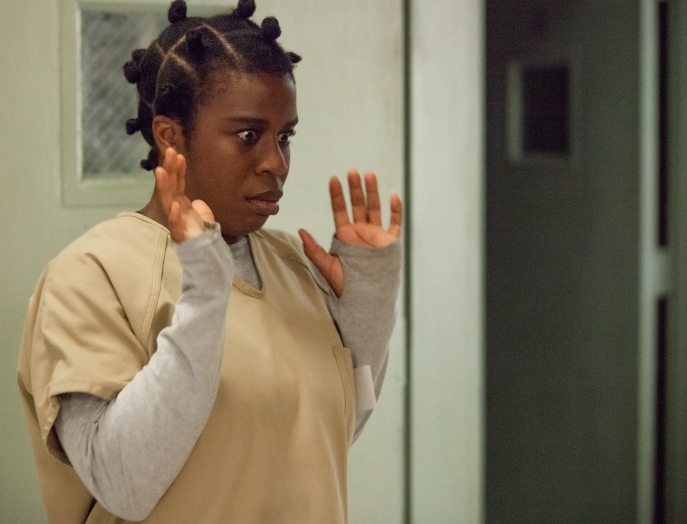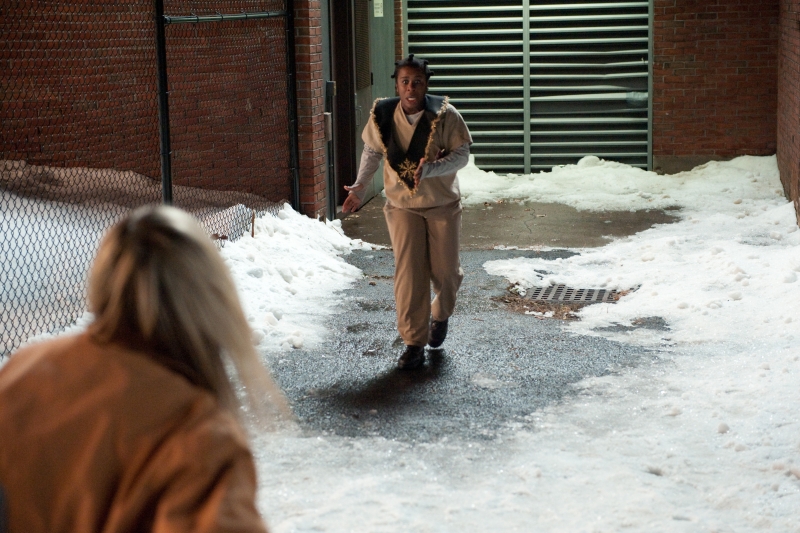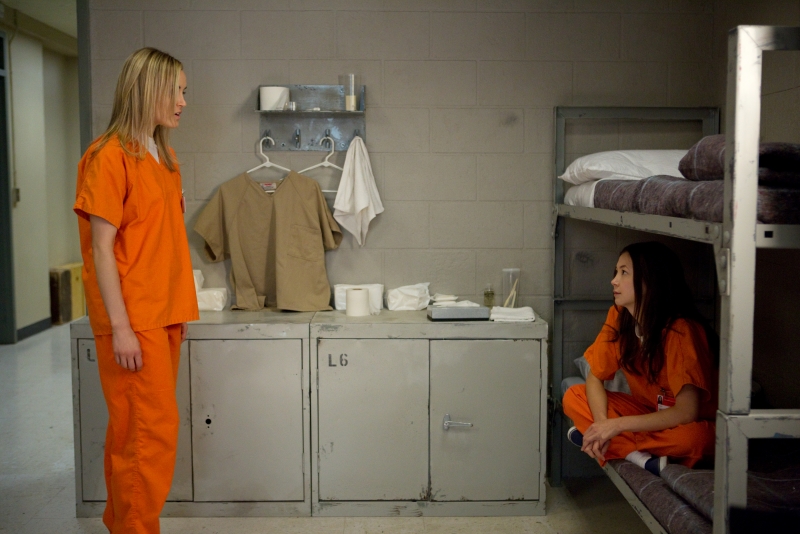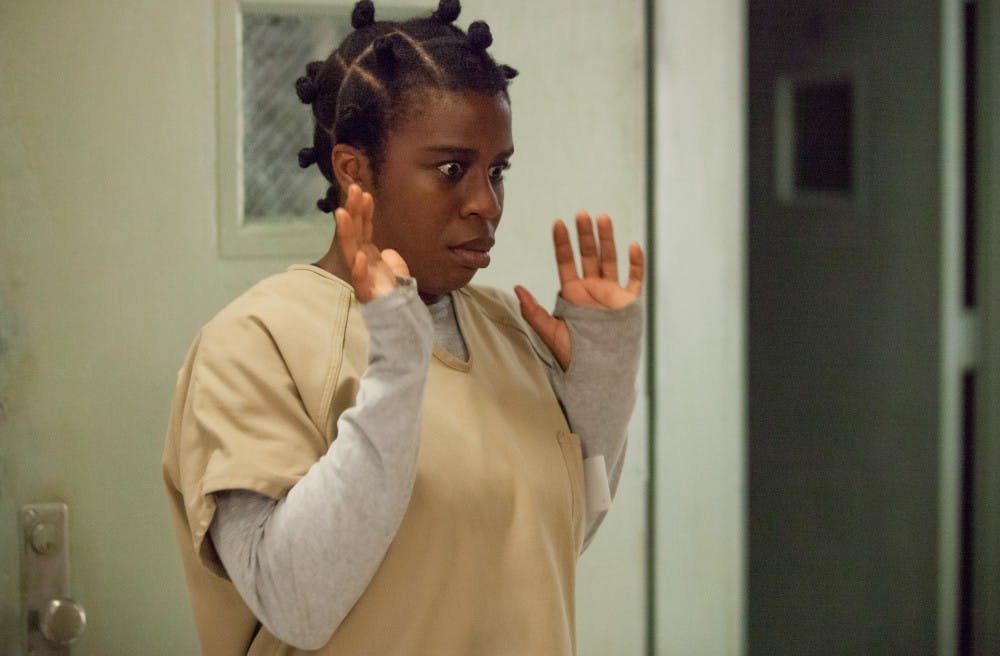
|
| Uzo Aduba portrays Suzanne in a scene from Netflix's "Orange Is the New Black" in the second season's third episode. PHOTO PROVIDED BY JESSICA MIGLIO FOR NETFLIX |
This is part of a weekly series of "Orange Is the New Black" recaps and reviews for the second season. Check back each week for two more episodes. To read about the previous episode, click here. To read about the next episode, click here.
 Rating: 4 out of 5
Rating: 4 out of 5
Last season, I was left wanting more of “Crazy Eyes.” The show started her out as a distant and strange character, but in doing as “Orange Is the New Black” does best, she became more fleshed out.
Gone is the degrading, if slightly true, moniker of “Crazy Eyes.” Her name’s Suzanne, and she is a human and this is part of her story.
Just like the previous episode, the show reveals some of Suzanne’s past without focusing on the reason she’s in Litchfield. While these flashbacks show scenarios that many children deal with, they’re amplified by her mental illness.
We see a young Suzanne, who was adopted by an affluent white couple, struggle to accept her baby sister. Her mother is determined to make sure Suzanne fits in, and by doing this, makes her go to a sleepover with her sister years later. As she’s four years older than the others and hard to adjust in social situations, the girls ridicule her. Her stage fright appears at her high school graduation as she’s practically forced on stage.
These scenes aren’t meant to completely explain Suzanne and luckily, they don’t pinpoint her personality on just one moment in her childhood. It’s a culmination of these events, and it shows that her parents’ effort to ensure Suzanne would be normal drove her anxiety, focused around her skin color in a sea of white, to something more.
That’s not to say her parents were evil. They just wanted their daughter to fit in, to overcome the difficulties she faced in society. Sadly, her struggles were seen as typical issues and not addressed as they should have been.
The high school stage fright flashback is spliced in with a flashback of last season’s Christmas pageant, an obvious parallel of the situations. In the Litchfield scene, we see Suzanne race out into the yard and project her mother onto Piper. This is how Piper is stopped from damaging Pennsatucky past the point of return and how the fight seemed more fair, as Suzanne punches Piper while screaming, “no more.”

|
| Suzanne, played by Uzo Aduba, runs into the yard to see Piper, played by Taylor Schilling, punching Pennsatucky in a flashback. PHOTO PROVIDED BY JESSICA MIGLIO FOR NETFLIX |
In present day, Vee emerges as a type of mother figure for Suzanne, and a very manipulative one. But Vee treats Suzanne with patience and respect. She builds up Suzanne’s self-worth — “Everybody else around here underestimates you. Not me.” — and it’s hard to not like Vee for this. Of course, she’s using Suzanne in her run for power in the prison and stirring the pot with Red and the stale cigarettes.
Aside from Suzanne, the episode manages to dart around smaller plots.
Bennett and Daya keep playing around with the threat of the administration finding out about her pregnancy, and I feel like this isn’t going to end well for Bennett. Smuggling with his prosthetic leg and being blackmailed is probably going to make him snap.
Taystee and Poussey provide a beautiful moment in the “Celebrity” game early in the episode, cementing my love for their friendship. If there were to be a spin-off, a show focusing on the day-to-day interactions between those two would make my dreams come true.

|
| Piper, played by Taylor Schilling, confronts Brooke, played by Kimiko Glenn, as Brooke sits on her bed. PHOTO PROVIDED BY JESSICA MIGLIO FOR NETFLIX |
Finally, Piper comes to terms with her prison identity at Litchfield. An old Piper might have put up with the annoyance of Brooke, a new inmate who has some characteristics of Piper but is a million times worse.
While she’s sympathetic at first, Piper doesn’t want a new friend. She’s hardened with a new reputation. “Don’t make me rip your throat out with my teeth.” Poor Brooke, Litchfield is not going to be good to you.
“Hugs Can Be Deceiving” is utilized as a setup episode with the title coming from the hugs between Red and Vee, Vee and Suzanne and Pennsatucky and Piper. Those three situations are bound to come bubbling to the top, and I have a feeling that it won’t be pretty.
| Ashley Dye is a senior journalism and telecommunications major and writes ‘The Dyessertation’ for the Daily News. Her views do not necessarily reflect those of the newspaper or The Daily. Write to Ashley at acdye@bsu.edu |





